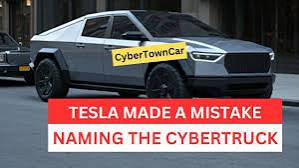The Problem with the Cybertruck: Tesla Should Have Called It the "CyberTownCar"
When Elon Musk unveiled the Tesla Cybertruck in 2019, it sent shockwaves through the automotive world. Its sharp angles, stainless steel exoskeleton, and futuristic design were unlike anything seen before on the road. But while the vehicle’s bold appearance and ambitious electric performance set it apart, there’s one aspect of the Cybertruck that might have been a misstep: its name. Instead of “Cybertruck,†Tesla could have more accurately positioned the vehicle by calling it the "CyberTownCar."
The name "Cybertruck" conjures up images of a rugged, off-road beast capable of tackling the most challenging terrains, like something straight out of a sci-fi dystopia. It suggests an uncompromising, industrial vehicle with heavy-duty features designed to haul loads or conquer wild landscapes. And while the Cybertruck is indeed tough, Tesla’s actual vision for the vehicle was something different—something that blends urban life with futuristic technology.
The name “CyberTownCar†would have better captured the essence of the vehicle’s true purpose, emphasizing its suitability for daily urban use, while still hinting at its futuristic capabilities. Think about it: the "Town Car" has long been associated with luxury and city transportation. For decades, the Lincoln Town Car was the choice of business executives, celebrities, and high-profile individuals who needed a reliable and elegant ride in bustling city environments. By calling it a “CyberTownCar,†Tesla would have positioned the Cybertruck not as a rugged off-roader, but as a sleek, durable, and tech-driven vehicle perfect for navigating modern cities.
Tesla’s vision for the Cybertruck is to offer an electric vehicle with practicality and performance that can still handle off-road adventures. But in reality, most people who buy pickup trucks, especially those of the Cybertruck’s size, do so for reasons other than off-roading. They might need the vehicle to haul tools, carry heavy loads, or tow boats or campers. In other words, the Cybertruck is less of a dirt road warrior and more of a futuristic utility vehicle designed to serve a multitude of urban and suburban functions. It’s about blending performance with daily use, all while showcasing cutting-edge electric technology.
By renaming the vehicle to “CyberTownCar,†Tesla could have better communicated this dual-purpose vision. The name would have clarified that while the Cybertruck was designed to be functional and durable, it was also a vehicle meant to fit into the daily routines of its owners, especially those living in metropolitan areas. With electric vehicles increasingly positioned as the future of urban mobility, a "CyberTownCar" would have underscored Tesla’s focus on a clean, sustainable, and futuristic alternative for everyday driving.
Furthermore, the name "CyberTownCar" would have differentiated the vehicle from the traditional image of trucks—vehicles often associated with rural landscapes, tough labor, or recreational off-roading. It would have emphasized that this new Tesla was less about being a rugged workhorse and more about redefining what it means to drive a stylish, durable, and environmentally conscious vehicle within the city.
In conclusion, while the Tesla Cybertruck is a revolutionary vehicle, its name might not entirely reflect the broader market it could serve. A name like "CyberTownCar" would better highlight its versatility, appealing to a wider demographic of urban drivers seeking sustainability, performance, and style in one package. A rebranding might just be the key to making Tesla’s futuristic vehicle even more relatable to the drivers of tomorrow.




No comments yet
Be the first to share your thoughts!